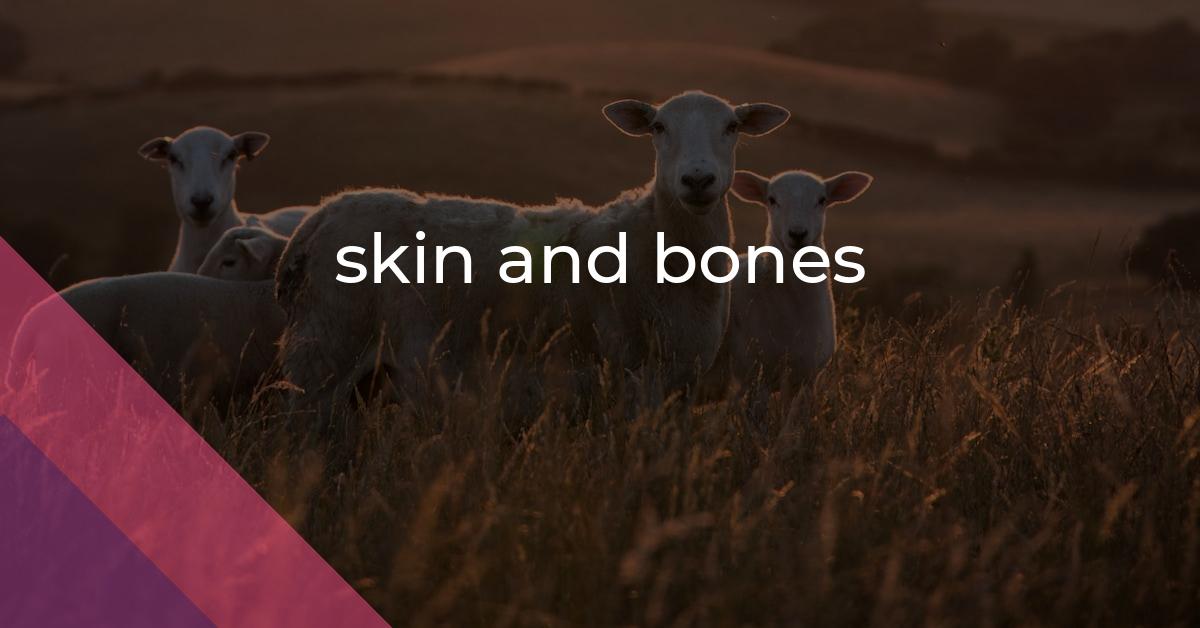skin and bones: Idiom Meaning and Origin
What does ‘skin and bones’ mean?
The idiom "skin and bones" refers to someone who is extremely thin or emaciated, with very little body fat or muscle. It is often used to describe a person who looks unhealthy, gaunt, or undernourished.

Idiom Explorer
The idiom "strip off" means to remove clothing or other outer layers or coverings.
The idiom "stone dead" means completely and utterly lifeless or without any sign of life. It is often used to describe something or someone that is completely motionless, inactive, or devoid of any vitality or energy.
The idiom "stick to someone's ribs" means that food is heavy or substantial enough to satisfy hunger and provide lasting nourishment.
Starvin' Marvin is an idiom used to describe someone who is extremely hungry. It is often used in a light-hearted or humorous manner.
The idiom "sore-thumbish" refers to something or someone that stands out noticeably from the rest of its surroundings, attracting attention and creating a sense of discomfort or unease.
The idiom "soaked to the skin" means completely wet, with water penetrating through one's clothing and reaching the skin.
An idiom widely used to refer to something insignificant or unimportant. It implies that the mentioned object or amount is of little value or significance.
The idiom "skin in the game" means to have a personal stake or investment in a situation, typically involving a risk or potential loss. It implies that someone is personally involved and stands to gain or lose something based on the outcome.
The idiom "skeleton in the cupboard" refers to a hidden or embarrassing secret or past action that someone wants to keep concealed.
Revealing Emaciation: Unraveling "Skin and Bones"
Idioms are expressions that have figurative meanings that differ from their literal interpretations. One such idiom is 'skin and bones', which is used to describe an extremely thin or emaciated person. This expression is commonly used in English-speaking countries, including the United States.
The origin of the idiom 'skin and bones' can be traced back to the 14th century. It is believed to have evolved from the Middle English phrase 'skyn bone' which meant 'bare bones' or 'skeleton'. The earliest recorded use of the exact phrase 'skin and bones' can be found in the work of the English poet Geoffrey Chaucer. In his famous literary masterpiece, 'The Canterbury Tales', Chaucer uses the phrase to describe a thin and sickly man.
'Skin and bones' is a vivid metaphor that suggests a lack of body mass or flesh. The word 'skin' represents the outermost layer of the body, while 'bones' symbolize the skeletal structure. When these terms are combined, they create a powerful image of a person who appears frail, weak, and malnourished.
The use of the idiom 'skin and bones' in modern English is often intended to emphasize extreme thinness. It is commonly used when describing a person who is noticeably underweight or emaciated due to illness, lack of proper nutrition, or poor health. This idiom is frequently employed in everyday speech, as well as in literature, journalism, and other forms of written communication.
'Skin and bones' is a versatile idiom that carries a strong visual impact. Its usage has become ingrained in the English language, and its meaning is easily understood by native speakers. This idiomatic expression not only serves as a descriptive tool, but also evokes certain emotional responses and associations related to physical appearance and health.
The idiom 'bag of bones' is closely related to 'skin and bones'. While 'skin and bones' focuses on extreme thinness, 'bag of bones' takes it a step further to describe a person who is extremely thin and frail, almost to the point of appearing skeletal. This idiom is often used to emphasize the lack of body mass and overall physical weakness of a person.
The idiom 'meat on one's bones' is the opposite of 'skin and bones'. While 'skin and bones' implies a lack of body mass, 'meat on one's bones' suggests the presence of a healthy amount of flesh and muscle. It is used to describe a person who is not overly thin, but rather has a healthy and robust physical appearance.
The idiom 'bone-dry' is unrelated to the physical body. It is used to describe something that is completely devoid of moisture or liquid. The word 'bone' in this context refers to the skeletal structure of the body, which is naturally dry. When applied metaphorically, 'bone-dry' implies a complete absence of any form of moisture or wetness.
The idiom 'meat on the bones' is similar to 'meat on one's bones', but it is used in a different context. 'Meat on the bones' is often used to describe the presence of substance, value, or substance in an idea, plan, or proposal. It implies that there is something substantial or tangible to work with, rather than just an empty or superficial concept.
Despite our extensive knowledge of the idiom 'skin and bones', there remains a sense of curiosity and wonder about the countless other idioms in the English language. Each one carries its own unique history and cultural significance. Exploring idioms allows us to delve into the intricacies of language and discover new perspectives and insights along the way.
Example usage
Example 1: She used to be so overweight, but now she's just skin and bones.
Example 2: The stray dog looked extremely skinny, like it was only skin and bones.
Example 3: After her illness, Lisa's once healthy-looking brother appeared to be nothing but skin and bones.
More "Appearance" idioms



